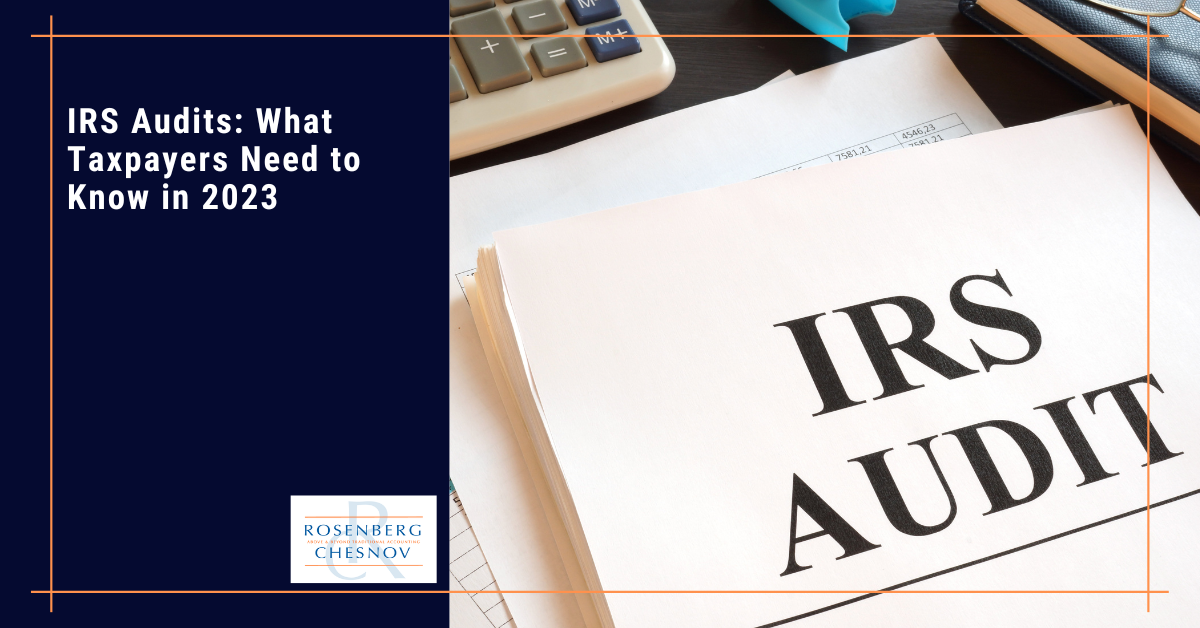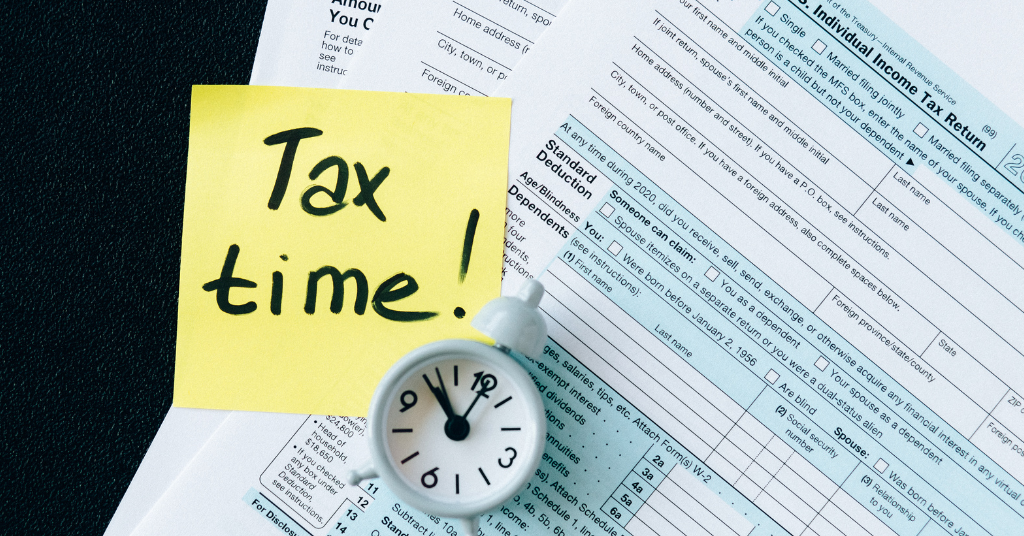

Common Errors When Filing Form 1040, U.S. Individual Tax Return
Category: Individual
All eyes are on the IRS this year, with interim Commissioner Douglas O’Donnell (Charles Rettig’s term ended in November of 2022) assuming leadership of a long cash-strapped agency now flush with billions of dollars of new funding and eager to crack down on tax evaders.
As the IRS kicks off the new tax season with new technology, a boosted workforce, and plenty of budget, you may wonder if your chances of being audited in 2023 will increase.
For many Americans, just the thought of an audit triggers anxiety. But with some information, understanding your outlook in 2023 can be relatively straightforward.
This blog post will provide an overview of the critical elements of an IRS audit, as well as guidance on navigating the audit process.


The good news for individual taxpayers is that the extremely low audit rates on middle or low earners are unlikely to increase this year. In fact, the IRS will use a large chunk of the new funding to improve the taxpayer experience! If your tax return is not overly complex, your annual income is less than $1 million, and you are not attempting to evade your tax liability, you won’t need to worry.
On the other hand, taking a lot of deductions or credits, owning a business, and having multiple sources or a high level of income are all factors that could trigger the newly emboldened IRS to take a closer look at your returns.
Again, if you report your income accurately, don’t attempt to claim deductions or credits to which you are not entitled, and file your return on time, your risk of an actual audit is still low. That said, mistakes or oversights can happen to anyone, especially when your taxes are complex.
An audit can be an intimidating and overwhelming process. However, it’s important to remember that being under audit does not imply that the IRS suspects you of criminal activity — the issue may be as simple as an unintentional error or needing confirmation of specific details. Often, an audit isn’t an investigation so much as an examination.
That said, the process is multifaceted, consisting of various elements, including formal and informal interviews, document and record requests, and financial analysis.
The IRS may manage your audit either by mail — the most common approach — or through an in-person interview, which may take place at an IRS office or your home, place of business, or accountant’s office. All contact information and instructions will be contained in the first communication you receive from the IRS, which they will send by mail.
Suppose the IRS is conducting your audit by mail. In that case, this initial letter will also request additional information about items shown on the tax return, such as income, expenses, and itemized deductions. At this point, if you have too many records to send by mail, you can request your audit be conducted face-to-face instead.
Subsequently, the process will consist of various elements, including informal and formal interviews, document requests, and financial analysis. Depending on the issues in your audit, IRS examiners may consult one of these Audit Technique Guides to assist them. These guides provide insights into issues and accounting methods unique to specific industries. If your audit is related to one of the industries covered, the relevant guide may also be helpful for you and give you an idea of what to expect.
Speaking more broadly, however, any audit process will require you to provide information about your finances and other related matters. During an informal interview, you must provide information, present documents, and answer questions. On the other hand, a formal interview is more structured, with examiners asking specific questions to which you’ll need to provide detailed written answers.
During an audit, the IRS will require you to provide specific documents to support your claims, prove income and deductions, and verify expenses, among other things. Depending on the case’s complexity, you may also need to produce documents such as bank statements, credit card statements, and other financial documentation.
Lastly, an audit generally includes a thorough financial analysis. The IRS will review the information you provide and conduct their due diligence to determine the accuracy of the information. They will look for discrepancies or changes in income or expenses and potential tax avoidance measures.
It sounds like a lot, and it is. But that doesn’t mean you can’t make the process smoother by being proactive, prepared, and polite — and by taking it seriously!
Your tax return may come under audit for several different reasons. For example:
Additionally, as mentioned above, the IRS is working to increase its audit rates for higher-income taxpayers, which are generally more complex than those of lower-income wage earners and require auditors to review multiple issues manually.
Most of your preparation for an audit should center on gathering documentation. Locate your old receipts, invoices, bank, credit card, brokerage, mortgage statements, pay stubs, account records, and emails. Digital point-of-sale and invoicing systems make it easier than ever to track down copies of old receipts. So try reaching out to vendors and suppliers if needed. Check your calendar, social media history, or cell phone logs if you need to reconstruct your travel history or mileage and ask yourself the tough questions. (The examiner certainly will!)
If you are missing documentation and can’t replace it or lost your original records in a disaster, you still have options, from reconstructing your records to establishing an item’s market value and approximating how much you paid.
Of course, the best way to prepare for an audit is by maintaining well-kept records without gaps in the first place (these tips will help!).
As you navigate the process, remember that you have a right to fair, professional, courteous, and confidential treatment by IRS employees. Furthermore, you have a right to know why the IRS is asking for information, how they will use it, and what will happen if you do not provide it.
Lastly, and critically: the most impactful action you can take in preparation for an audit may be the immediate hiring of a tax professional.
The tax code is extremely complex, and your tax return may be, too. Working with someone with the necessary training and experience to understand and articulate your position is essential. Additionally, a tax professional can help you address proposed penalties and, if possible, refute the examiner’s rationale.
In all but the most straightforward cases, hiring an experienced representative will be well worth the cost, and failing to do so can be a serious mistake.
If you are a client and would like to book a consultation, call us at +1 (212) 382-3939 or contact us here to set up a time.
If you aren’t a client, why not? We can take care of your accounting, bookkeeping, tax, and CFO needs so that you don’t have to worry about any of them. Interested? Contact us here to set up a no-obligation consultation.
Interested in receiving updates in your mailbox? Check out our newsletter, full of information you can use. It comes out once every two weeks, and you can register for it below.


Category: Individual


Category: Accounting


Category: Accounting
Send us a message and we will contact you as soon as possible.
Send us a message and we will contact you as soon as possible.
Jeff Coyle, CPA, Partner of Rosenberg Chesnov, has been with the firm since 2015. He joined the firm after 20 years of business and accounting experience where he learned the value of accurate reporting, using financial information as a basis for good business decisions and the importance of accounting for management.
He is a diligent financial professional, able to manage the details and turn them into relevant business leading information. He has a strong financial background in construction, technology, consulting services and risk management. He also knows what it takes to create organizations having built teams, grown companies and designed processes for financial analysis and reporting.
His business experience includes:
Creating and preparing financial reporting, budgeting and forecasting.
Planning and preparation of GAAP and other basis financial statements.
Providing insight on financial results and providing advice based on those results.
Jeff also has a long history of helping individuals manage their taxes and plan their finances including:
Income tax planning and strategy.
Filing quarterly and annual taxes.
Audit support.
General financial and planning advice.
Prior to joining the firm in 2015, Jeff was in the private sector where he held senior financial and management positions including Controller and Chief Financial Officer. He has experience across industries, including construction, technology and professional services which gives him a deep understanding of business.
Jeff graduated from Montclair State University, he is a CPA and member of the American Institute of Certified Public Accountants, New York State Society of Certified Public Accountants and New Jersey State Society of Public Accountants.
Jody H. Chesnov, CPA, Managing Partner of Rosenberg Chesnov, has been with the firm since 2004. After a career of public accounting and general management, Jody knows the value of good financials. Clarity, decision making, and strategy all start with the facts – Jody has been revealing the facts and turning them into good business results for more than three decades.
He takes a pragmatic approach to accounting, finance and business. His work has supported many companies on their path to growth, including helping them find investors, manage scaling and overcome hurdles. His experience and passion for business reach beyond accounting and he helps businesses focus on what the numbers mean organizationally, operationally and financially.
He has a particular expertise in early-stage growth companies. His strengths lie in cutting through the noise to come up with useful, out of the box, solutions that support clients in building their businesses and realizing their larger visions.
Prior to joining the firm in 2004, Jody was in the private sector where he held senior financial and management positions including General Manager, Chief Financial Officer and Controller. He has experience across industries, which gives him a deep understanding of business.
Jody graduated with a BBA in Accounting from Baruch College, he is a CPA and member of the American Institute of Certified Public Accountants and New York State Society of Certified Public Accountants.
In addition to delivering above and beyond accounting results, Jody is a member of the NYSCPA’s Emerging Tech Entrepreneurial Committee (ETEC), Private Equity and Venture Capital Committee and Family Office Committee.
He is an angel investor through the Westchester Angels, and has served as an advisor for many startup companies and as a mentor through the Founders Institute.